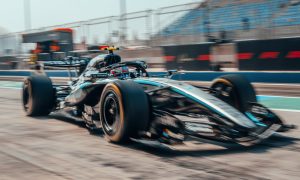
With the launch of Mercedes' 2016 W07, the team's High Performance Powertrains managing director Andy Cowell offers some insight into the latest iteration of the German manufacturer's power unit.
"To get the performance out of this new generation of Power Units, you need to chase efficiency," Cowell insisted.
"That's both combustion efficiency and efficiency in the various energy transition steps - i.e. MGU-H, MGU-K, turbocharger, power electronics and batteries. We're constantly working on every single piece of the puzzle to improve performance at the crankshaft, while also seeking to ensure we don't suffer any of the problems we had last year with reliability.
"So, it's about getting down to the root cause of issues and making sure that everything is robust across our whole process, as much as extracting performance. "
Cowell also underlined his amazement at the engineering accomplishments achieved since the introduction of the hybrid engine in 2014.
"These Power Units really are incredible feats of engineering. We're now running at more than 47% thermal efficiency and producing historic highs of power - and all with an ICE restricted to consuming fuel at a rate of just 100kg/hr.
"The old-fashioned, naturally aspirated engines peaked at 29% thermal efficiency during the V8 era - while the last time we saw these levels of power in Formula One was back in 2005, with a V10 that guzzled fuel at a whopping 194kg/hr. To halve the fuel flow rate for the same amount of power is quite something.
With regard to Formula 1's increased schedule in 2016, which has been extended by an extra two races, Andy Cowell elaborated on Mercedes approach.
"On the face of it, an increased allocation of Power Units would seem to give manufacturers an advantage, in that each unit is required to complete fewer races, thereby putting less pressure on the life cycle of different components.
"But the reality is that our durability targets have remained the same. Our target is to make sure that each Power Unit can last for at least five races, meaning that theoretically we only need to use four per driver, across the season.
"We believe this gives us a good opportunity to react if we have a reliability problem - or potentially to use the extra units to our advantage for a performance enhancement at key races."
FEATURE: The delicate balance between F1 engine and chassis
Key dates for the 2016 F1 season
Keep up to date with all the F1 news via Facebook and Twitter







